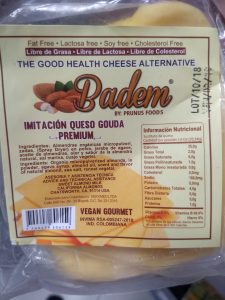Colombia offers a sizeable number of vegan and vegetarian restaurants, especially in larger cities, as well as natural food stores and delivery services that sell vegan products. Be vigilant however: there are a few products that are fraudulently labeled vegan.

I bought this “vegan” cheese at Ceres Market in Medellin. The fat-free claim and ingredient list struck me as odd but I bought it anyway, vaguely thinking that the list might be false or incomplete without considering that the product might not be vegan.
I’ve been a vegan for so long that when I first tasted the cheese, the flavor didn’t tip me off. I then threw some in a pan of zucchini I was sautéing, wondering if it would melt. It melted immediately. It had barely touched the zucchini and it was already a puddle. I’ve cooked with many vegan cheeses and never saw one melt so quickly. The cheese was also extremely stringy, something I have again never seen in a vegan cheese.
I texted a local animal rights activist a picture of the package and asked if she knew the brand and whether she thought it was vegan. This was her response:
“We don’t consume it because we don’t think it’s vegan. They used to use the Follow Your Heart label, later someone contacted Follow Your Heart and was told that they had taken legal action against this company. The packaging used to say “vegan cheese” and now it doesn’t say that anymore. Anyway, there were several inconsistencies and we prefer not to consume it, especially since we’ve tried many vegan cheeses around the world and none of them are like this one, whereas it is exactly like non-vegan cheese.”
So this seedy company is using the vegan trend to scam people into paying a premium on cow’s cheese. Needless to say, this is wholly unethical. Of course, selling cheese made from cow’s milk is always unethical due to the unavoidable cruelty to the cows and calves, but this is also cruel towards humans. People who eat fake vegan cheese might be intolerant or allergic to milk, and/or are being made to support an industry they find morally abhorrent.
This incident also recast a doubt on an earlier incident, when I got a vegan tamale to go from a vegetarian restaurant in Medellin. Eating it the next day, the vegan chicken struck me as very different from any other mock meat I’ve eaten. I threw away the tamale, emailed the restaurant to ask what brand of veggie chicken they used and never got an answer. In the meantime I found a Colombian online vegan store that sold tamales that seemed to be same ones I had eaten, so I decided that my concerns had been unwarranted. I think this is the chicken they use. However, after the cheese incident, I’m less inclined to automatically trust that something is vegan just because it’s labeled as such.
For the most part, I haven’t had concerns with vegetarian and vegan restaurants, with the exception of the tamale and a couple times when my soup had a suspiciously meaty flavor. If the food looks like it’s made from scratch – and it usually is – there’s probably nothing to worry about. I don’t think anyone is adding non-vegan ingredients on purpose, but in the case of the soup I think it’s possible that some meaty bouillon made its way there unnoticed. Another criteria is whether the owners or workers are veg*n themselves. It would be obnoxious to ask this at every restaurant you go to, but if you’re already making conversation you can take the opportunity to find out. If the people running the restaurant are vegan and/or if they are making food from scratch, I would not worry. I still wouldn’t worry if that’s not the case, but I think that while mistakes are unlikely, they can happen.
One final note is that, like elsewhere, replacements of common foods are not always vegan. I recently visited a natural foods store where there were two cheese alternatives: the fraudulent ones from the brand above, and an almond-based cheese that contained casein. There was no dishonest marketing with the latter but it said “almond cheese”, so it’s a reminder to always check the ingredients. Also, not all plant-based milks in Colombia are vegan, as they may use animal-based vitamins or additives. Before buying a new brand of milk, it can be useful to contact the company or check to see if the product is featured here. I’ve noticed however that many of the coffee shops that offer almond and soymilk use Silk, which is vegan, so this isn’t often a problem.
While Colombian food is typically meat-heavy, it’s also easy to travel here as a vegan. Just avoid “Badem”* cheese and remember that if something seems off, it just might be.
* Badem means almond in Persian.
Update (Nov. 6): I’ve come across some Colombian restaurant reviews that warn that recipes labeled vegan – with vegan cheese – were not vegan. In one case, posters with lactose intolerance experienced strong symptoms after eating a lasagna with “vegan” cheese. The restaurant in question has both a vegetarian and meat-based menu, so this is the problem that I touched upon. No doubt, the owner’s intention was to create vegan dishes, but not being vegan or vegetarian himself, he did not do the research to ensure that the cheese he buys is really vegan. In these cases it’s best to stick to simpler dishes that don’t contain meat or dairy substitutes.
